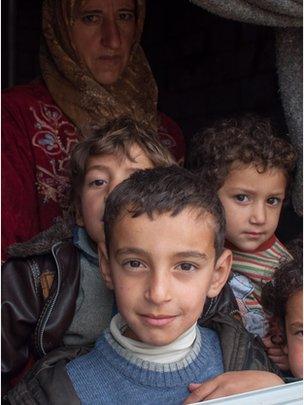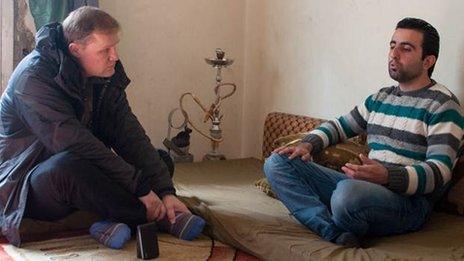Lasting scars of Syria's assault on Baba Amr
- Published
Homs refugees in Lebanon tell the BBC's Paul Wood: "Freedom doesn't come cheap"
One year ago this month, the Syrian army launched one of the most intense assaults of the conflict, with the bombardment of the Baba Amr district of Homs. The operation was meant to crush the rebel Free Syrian Army there, but thousands of civilians bore the brunt of the attack which lasted for more than three weeks.
The BBC's Paul Wood, who was one of the few foreign journalists in Baba Amr at the time, visited refugees who fled the siege which came to be seen as a turning point in the war.
"Freedom isn't worth this," said a woman quietly, peering out through the steady rain at refugee children jumping over puddles in the Lebanese border town of Arsal.
Living in freezing "temporary" shelters of breeze block and tin, or squeezing several families into one borrowed room, thousands of Syrians are now entering their second year as refugees here.
Some are from Baba Amr in Homs. A small enclave of defiance, it briefly came to exemplify the hopes of the revolution. But Baba Amr was crushed in 25 days of shelling that began in February 2012.
I was there during the assault, part of a small BBC team. At the time, everyone in Baba Amr told us they were convinced the bombardment would bring help from the outside world.
Omar Shakir, an activist in the Baba Amr media centre, now a refugee in the Lebanese city of Tripoli, remembers the mood of optimism, even as the shells were falling.
"After a few days of the [military] campaign, we made a plan. We wrote it on our board. We wrote at the end of it that Baba Amr will bring down Assad. We thought that the media will bring a live stream and… Nato will immediately come and destroy all the regime's rocket launchers. All of the people thought the same."
Lack of help
That belief evaporated when Baba Amr fell - leaving behind bitterness and anger among the refugees who fled from there.

Civilians in Baba Amr were subjected to shelling day and night for almost a month
"The whole world watched while we were butchered," said Ahmed Idriss, an aid worker in Arsal and a refugee himself.
"Of course, we blame the international community for that. But it doesn't really matter now: we don't expect help from them any longer. Now we put our faith in God and in the Free Syrian Army [FSA]."
The FSA in Baba Amr had only Kalashnikovs, while the government was able to rain down shells and mortars and finally sent in tanks.
The FSA staged what they called a "tactical withdrawal". Some residents of Baba Amr accused the rebels of picking a fight they could not win, saying many lives would have been spared if they had left at the start.
Taking the opposite view, some activists there were angry at the FSA for fleeing, believing that, even without Nato, continued defiance in Baba Amr - however high the cost - might have spelt the end of the Assad regime.
It was a one-sided battle. The shelling would start at 6am and continue until dusk without pause. It was so bad, they had to steal out at night to bury their dead.
If people tried to leave the area, they were shot at by snipers. We spent several hours at the makeshift hospital, run by volunteers without surgical training.
Mortars fell in the street outside as women screamed in the corridor. An 11-year-old boy was brought in, his jaw torn off in an explosion, everything below the nose just bloody shreds. He was conscious and looked up at us, stunned. He died the next day.
Death routine
Baba Amr's defence was led by Captain Mohammed Idriss of the FSA's Farooq Brigade [a cousin of the refugee worker in Arsal].
"They are killing civilians because they can't get to us," he told me during the bombardment last February.
Capt Idriss had been an instructor at the Syrian army's infantry school in Homs. He had defected to the FSA only two months earlier. He escaped Baba Amr but was killed by a shell several months later, as he went to help an injured man in the street.
I met his parents, also refugees in Arsal. "We tried to delay it as any parent would, hoping things might be resolved," said Atif Idriss of his son's decision to join the rebels.
"But he just couldn't take what was being done to our people." As Mr Idriss spoke, his wife sat beside him, silently weeping.
He went on: "We have paid a high price for freedom but freedom doesn't come cheap. We accept our fate. We are confident of victory."
Capt Idriss's cousin, Ahmed - the aid worker - told me that death had become normal, every day.

There is widespread perception among refugees like Ahmed Idriss that the international community is leaving Syria to destroy itself
"Before the revolution, villages grieved for a month [if they lost someone]. Now it's… just hours," he said. "People are becoming more religious, too. We see the hand of God in what is happening and we accept that sacrifices will have to be made. We have faith."
With the bitterness I had heard from many refugees, he continued: "It's obvious that the FSA is receiving almost nothing from outside. It's as if the international community wants to prolong the conflict, to weaken and destroy the country."
He added: "Our people are ready for everything and anything. It has been two years [of war] and they are ready for another two years. Even more."
Rallying cry
Over those past two years, at least 60,000 people have been killed in Syria, some two-and-a-half million displaced.
Though it might not have seemed so at the time, the fall of Baba Amr was a turning point. Baba Amr became a rallying cry. Thousands joined the armed uprising. More and more rebel groups sprang up. One, in Idlib, was even called the Revenge for Baba Amr Brigade.
Syria lurched deeper into today's civil war. The activists hope that - costly and bloody as that civil war is - it will have only one conclusion, the end of the regime.
Omar Shakir recalls: "When Baba Amr fell, there were demonstrations all over Syria. Finally, people understood that this regime will never go in a peaceful way, without fighting… We changed the course of the revolution."
 Smuggled across the border
Smuggled across the border
 Inside bleeding Homs
Inside bleeding Homs
 The constant shelling
The constant shelling
 Nowhere to hide
Nowhere to hide
 'No one is coming to help'
'No one is coming to help'
 Fleeing under darkness
Fleeing under darkness
 Despair in refugee camp
Despair in refugee camp
 Saviours or terrorists?
Saviours or terrorists?